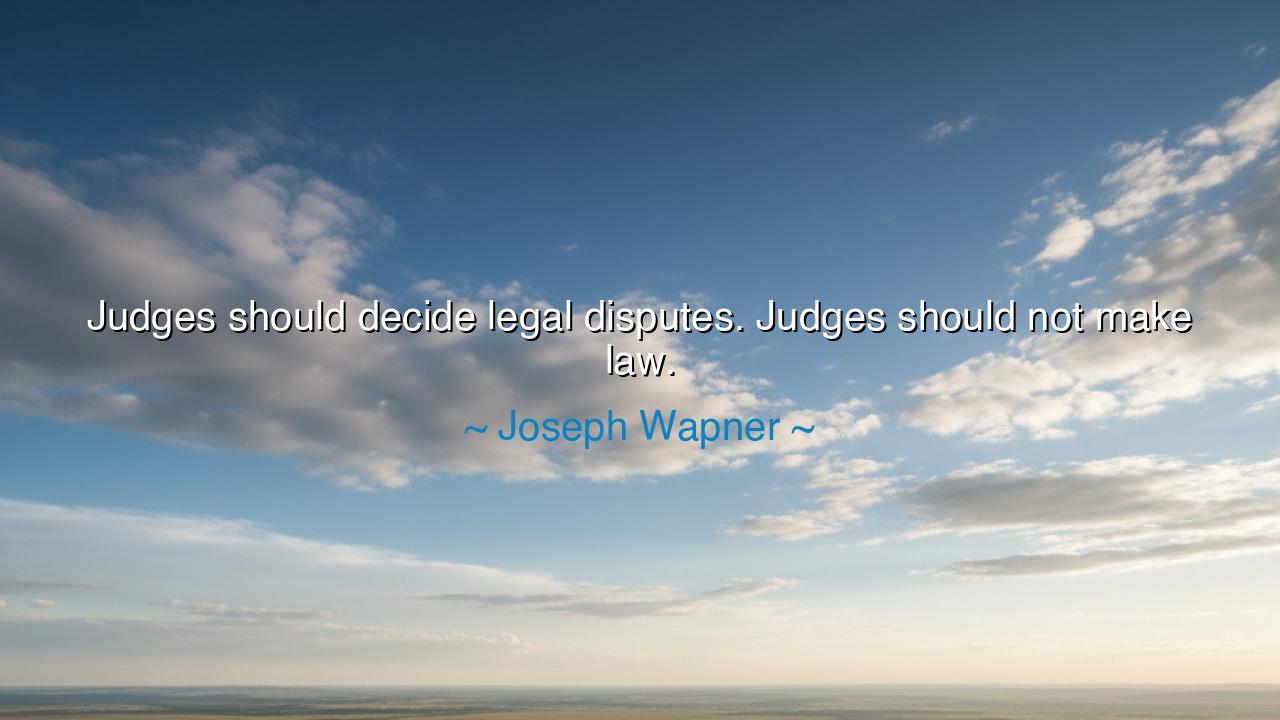
Judges should decide legal disputes. Judges should not make law.






The words of Joseph Wapner ring with clarity and ancient authority: “Judges should decide legal disputes. Judges should not make law.” Within this simple yet profound statement lies the enduring tension between adjudication and legislation, between interpreting the rules and creating them. Wapner reminds us that the power of the judiciary is immense, but it must be exercised within the confines of justice and tradition, lest the scales tip toward arbitrary authority. The judge’s role, he declares, is to discern, weigh, and resolve, not to invent the rules under which society lives.
The origin of this reflection lies in Wapner’s career as a jurist and television judge, where he observed firsthand the limits of judicial authority and the perils of overreach. By emphasizing that judges must refrain from legislating from the bench, Wapner echoes a principle as old as recorded law: that legitimacy rests on defined boundaries, and that exceeding these boundaries endangers both law and society. In essence, he affirms that the power to judge must be restrained, grounded in statute, precedent, and principle, rather than personal will.
In the annals of history, civilizations have often grappled with the proper role of those entrusted to interpret the law. The Greeks and Romans warned that those who exceed their mandate — ruling not by law but by whim — invite instability. The Twelve Tables of Rome, one of the earliest codifications of law, existed precisely to limit judicial discretion and ensure predictability. Judges who sought to make law in those times were seen as undermining the public trust, creating precedents not of justice, but of favoritism and caprice. Wapner’s words echo these ancient warnings: the judiciary must remain an arbiter, not a legislator.
Consider the example of Chief Justice John Marshall in early American history. While Marshall’s decisions shaped the contours of constitutional interpretation, he often faced criticism for appearing to expand judicial power. Yet even he exercised caution: his rulings sought to clarify and interpret the law, rather than invent statutes. Wapner’s admonition aligns with this wisdom: a judge’s authority derives from application and insight, not from lawmaking. To blur these roles is to risk confusion, resentment, and the erosion of legal legitimacy.
Wapner’s quote also carries a moral dimension. The law is a covenant between the governed and those who govern; when judges exceed their mandate, they violate this covenant, shifting power from a structured, collective process to the discretion of one individual. In medieval Europe, judges who issued decrees beyond their authority often provoked rebellion and social unrest. Their pronouncements, though persuasive, lacked legitimacy because they contravened established law. Wapner’s lesson is timeless: authority unmoored from law becomes tyranny.
Furthermore, Wapner highlights the importance of clarity and separation of powers. In a just society, the legislature creates, the executive enforces, and the judiciary interprets. Each branch supports the others, creating a balance that safeguards liberty. When judges encroach into legislation, this balance fractures. The people lose confidence in both law and government, as the lines between judgment and policymaking blur. Wapner’s words are a call to preserve this ancient principle: that justice is strongest when each actor honors their proper role.
The enduring lesson is both practical and ethical. Judges must wield authority with humility, applying law with integrity and restraint. Citizens, in turn, must respect these limits, understanding that justice is a collaborative structure, not the product of a single mind. Wapner’s wisdom reminds us that the legitimacy of law lies in structure, clarity, and fidelity to principle, not in the charisma or imagination of those who interpret it.
Thus, let the words of Joseph Wapner echo through generations: adjudicate with discernment, respect the law as it is written, and never let the power to judge become the power to legislate. The judge who honors this boundary strengthens society, preserves trust, and ensures that the scales of justice remain balanced. In every court, in every decision, the lesson is the same: rule with insight, not invention, and let law, not will, guide the hand of judgment.






AAdministratorAdministrator
Welcome, honored guests. Please leave a comment, we will respond soon